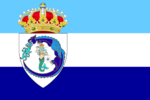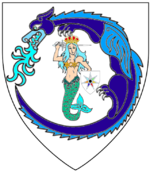Parangón
| Kingdom of Parangon Reino del Parangón | |
| Flag | Coat of arms |
|---|---|

|

|
| Motto: Our flame will never fade | |
| Anthem: Azurean March | |
| Locator map | |
| File:Parangonloc.png | |
| Capital city | Omialga |
| Largest city | Dragonsword |
| Official language | Wanləish |
| Other languages | Spanish, Panomin |
| Ethnic group | South Ademians - Other |
| Religion | Parangonese Sadarisnism |
| Demonym(s) | Parangonese |
| Government | |
| Government Type | Semi-constitutional matriarchal monarchy |
| Queen | Yulia Débrez de Ascuazul |
| Prime Minister | David Martínez Láirez |
| Legislature | Senate of Parangon |
| Establishment | |
| Kingdom's Foundation | a |
| Area | |
| Total | 1,084,746.17 km2 |
| Population | |
| Total | 52,862,284.38 |
| Density | 48.73/km2 |
| Economy | |
| Economy type | Capitalist |
| GDP (total) | Ꞡ 317,166,154,545.53 |
| GDP per capita | Ꞡ 5,999.86 |
| Currency | d (₳) |
| Inequality index | e |
| Development index | f |
| Other information | |
| Time zone | -3 |
| Driving side | right |
| Calling code | ¿? |
| Internet code | .pa |
| Nation number | 115 |
Parangón, officially the Kingdom of Parangón, is a country in Anaria.
Parangón's society is mainly based on trade, tourism, gastronomy and religion. Their head of state is a queen who reigns along with a husband prince (a king consort, basically). Parangón's flag is a horizontal tricolor with a light blue - white - dark blue pattern. On the left side of the flag the country's coat of arms is placed with a crown above it. The coat of arms is composed of two figures. At the center lies a mermaid, who is wearing a crown, along with a rapier sword on her right hand and a shield on her left hand. The symbol on her shield represents Heptasdinism, a variation of the religion of Sadarisnism. Surrounding the mermaid looms a blue dragon that spews cyan flames. This dragon is known as Cuarién, and it's central to the country's folklore.
Toponymy
The country's name "Parangón", has two possible origins. The most accepted theory is that it comes from the Spanish expression No hay parangón, which means "there's nothing alike", which reflects the uniqueness of the land.
Another theory is that it comes from the Wanləishi word Pyər yə ango, which means "fire and shore", which it makes sense, taking into account that the country's folklore revolves upon these subjects.